Abstract
This review evaluates current epidemiologic literature on health effects in relation to residence near landfill sites. Increases in risk of adverse health effects (low birth weight, birth defects, certain types of cancers) have been reported near individual landfill sites and in some multisite studies, and although biases and confounding factors cannot be excluded as explanations for these findings, they may indicate real risks associated with residence near certain landfill sites. A general weakness in the reviewed studies is the lack of direct exposure measurement. An increased prevalence of self-reported health symptoms such as fatigue, sleepiness, and headaches among residents near waste sites has consistently been reported in more than 10 of the reviewed papers. It is difficult to conclude whether these symptoms are an effect of direct toxicologic action of chemicals present in waste sites, an effect of stress and fears related to the waste site, or an effect of reporting bias. Although a substantial number of studies have been conducted, risks to health from landfill sites are hard to quantify. There is insufficient exposure information and effects of low-level environmental exposure in the general population are by their nature difficult to establish. More interdisciplinary research can improve levels of knowledge on risks to human health of waste disposal in landfill sites. Research needs include epidemiologic and toxicologic studies on individual chemicals and chemical mixtures, well-designed single- and multisite landfill studies, development of biomarkers, and research on risk perception and sociologic determinants of ill health.
Full text
PDF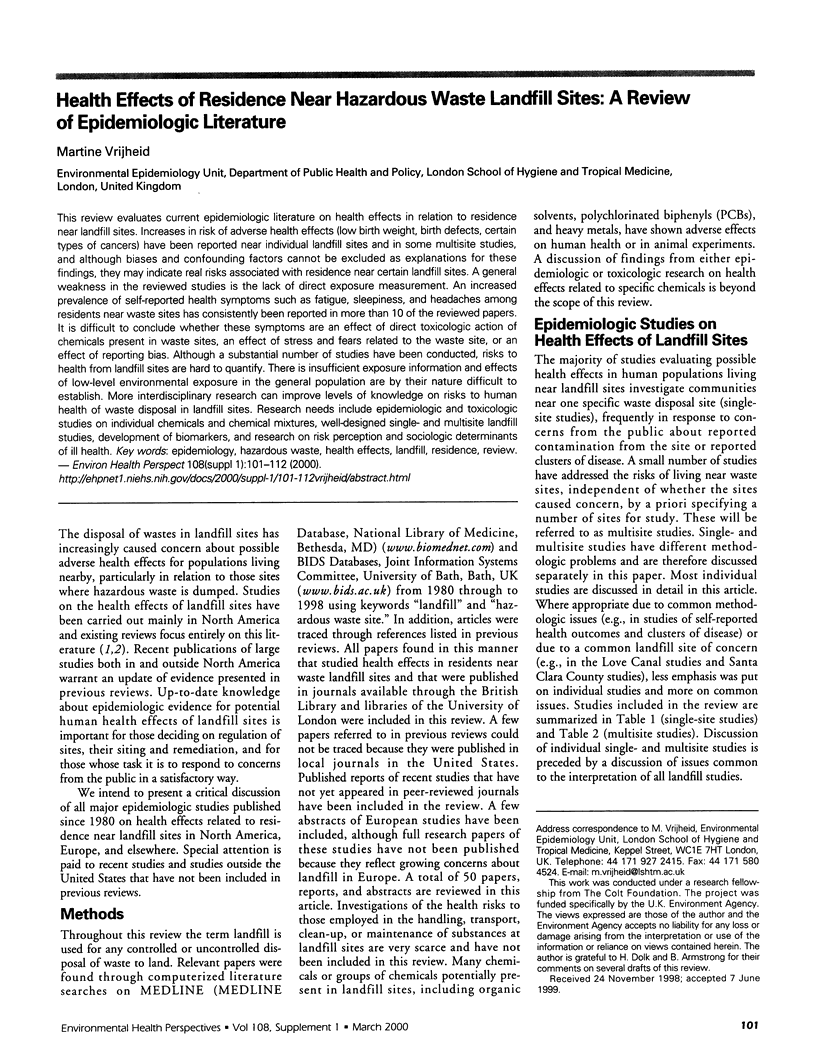
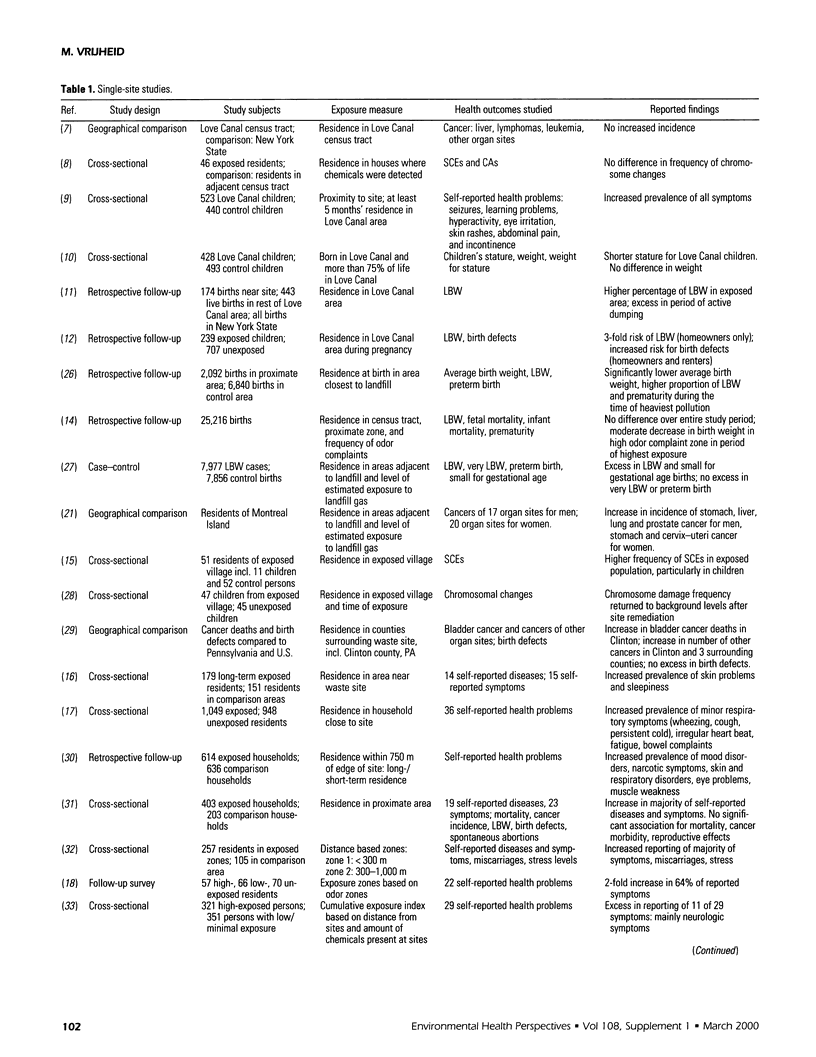
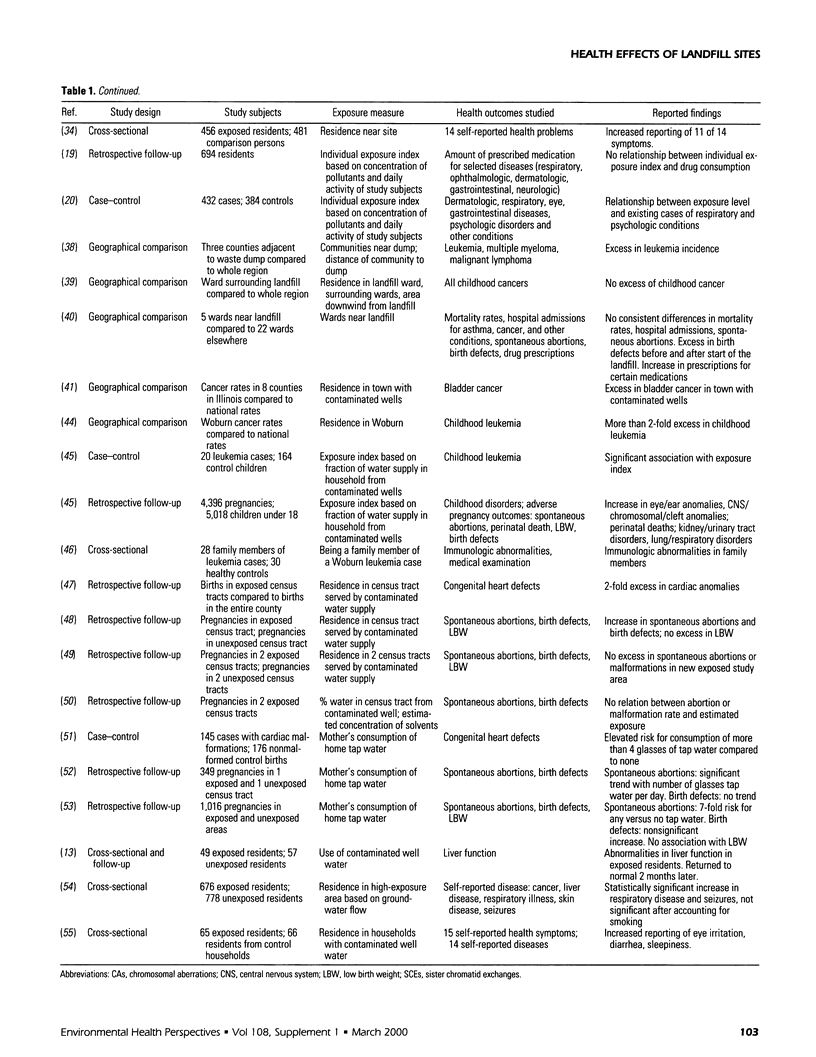
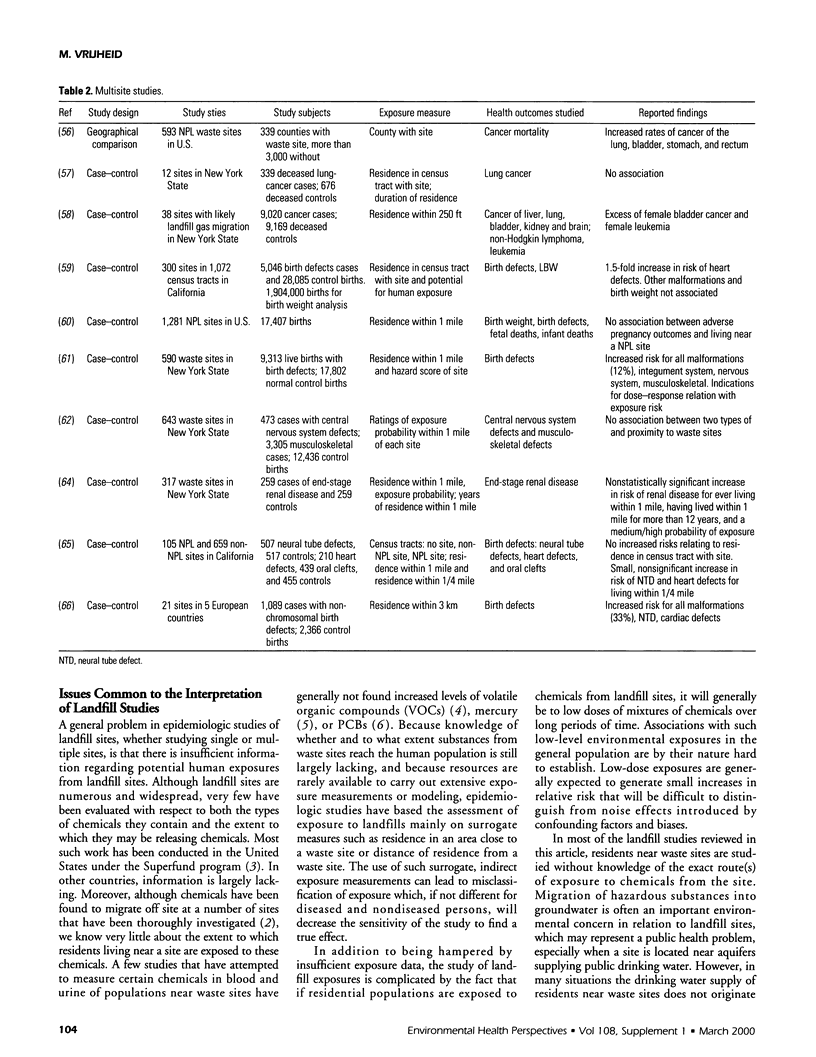
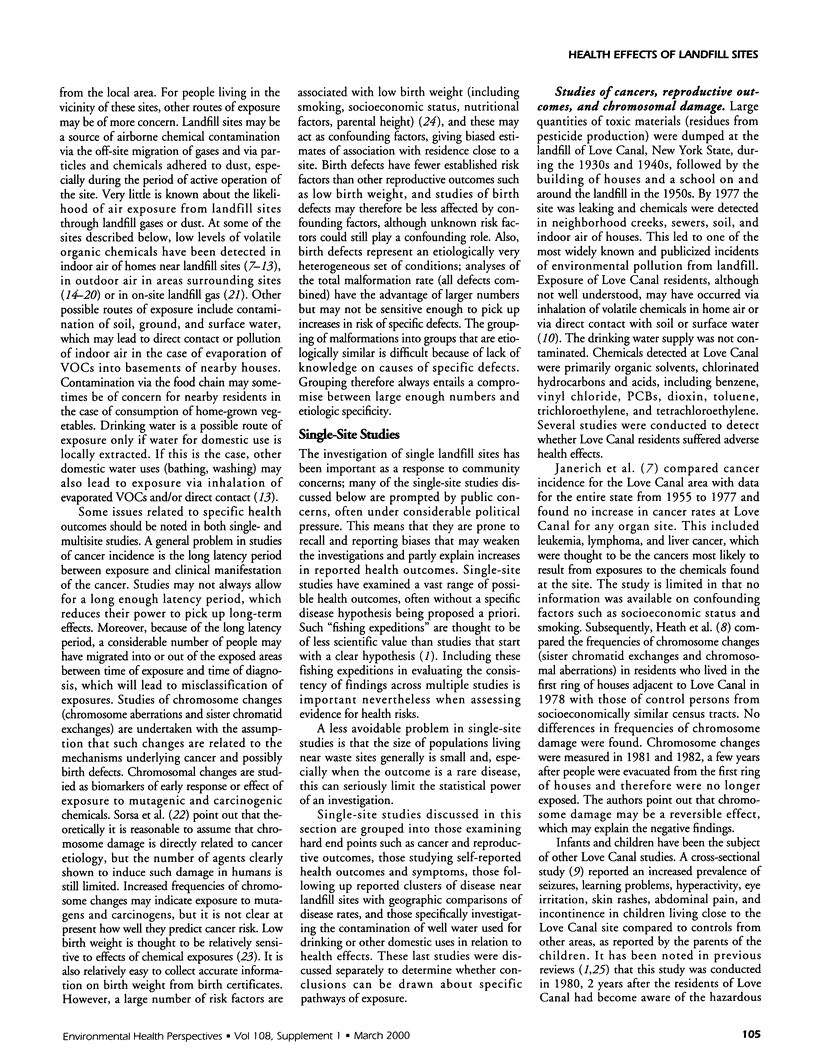
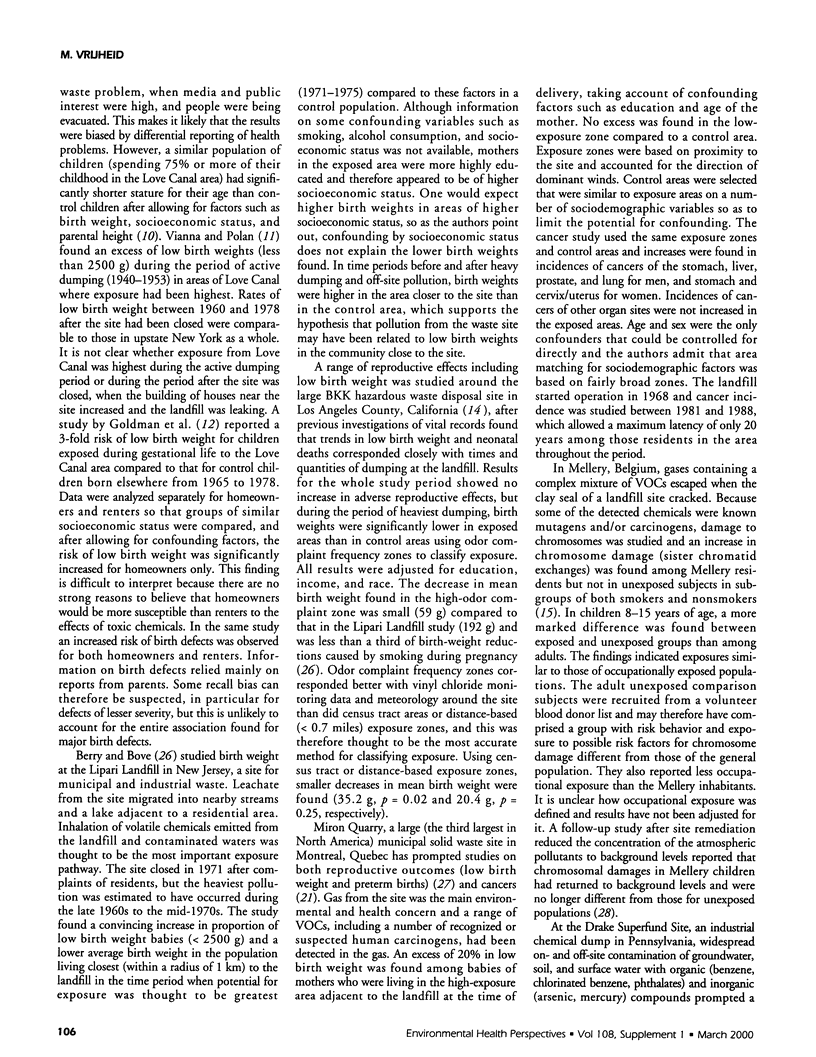
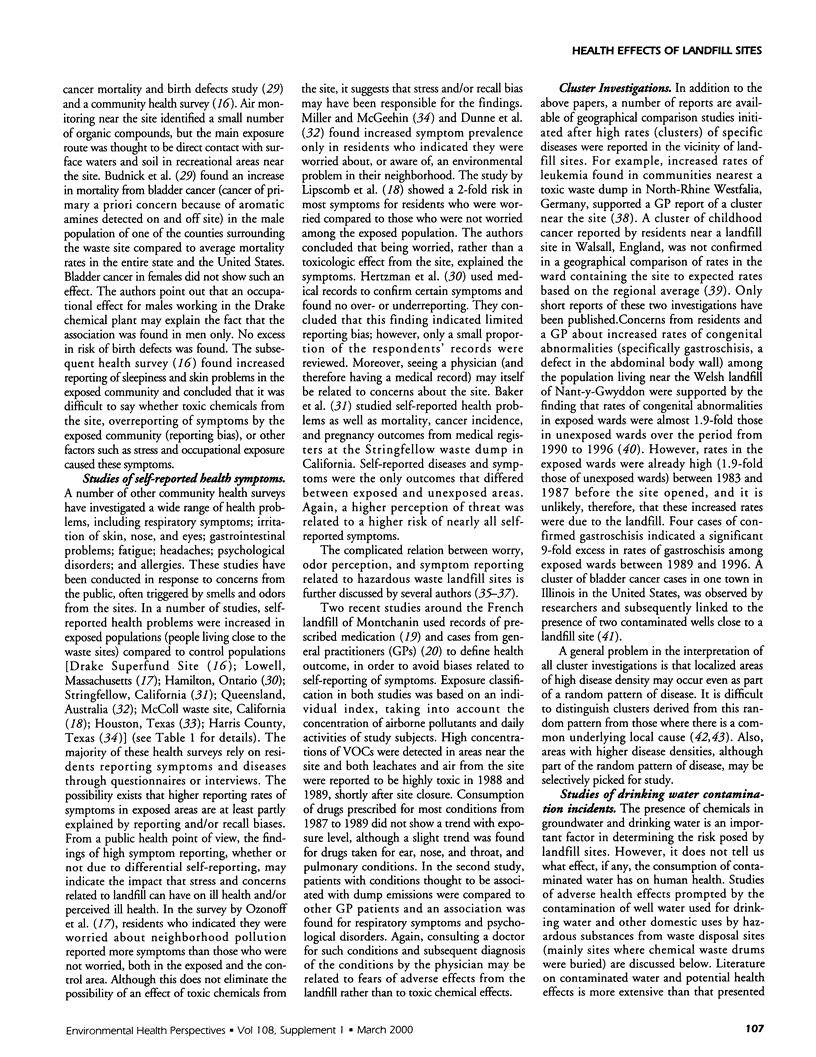
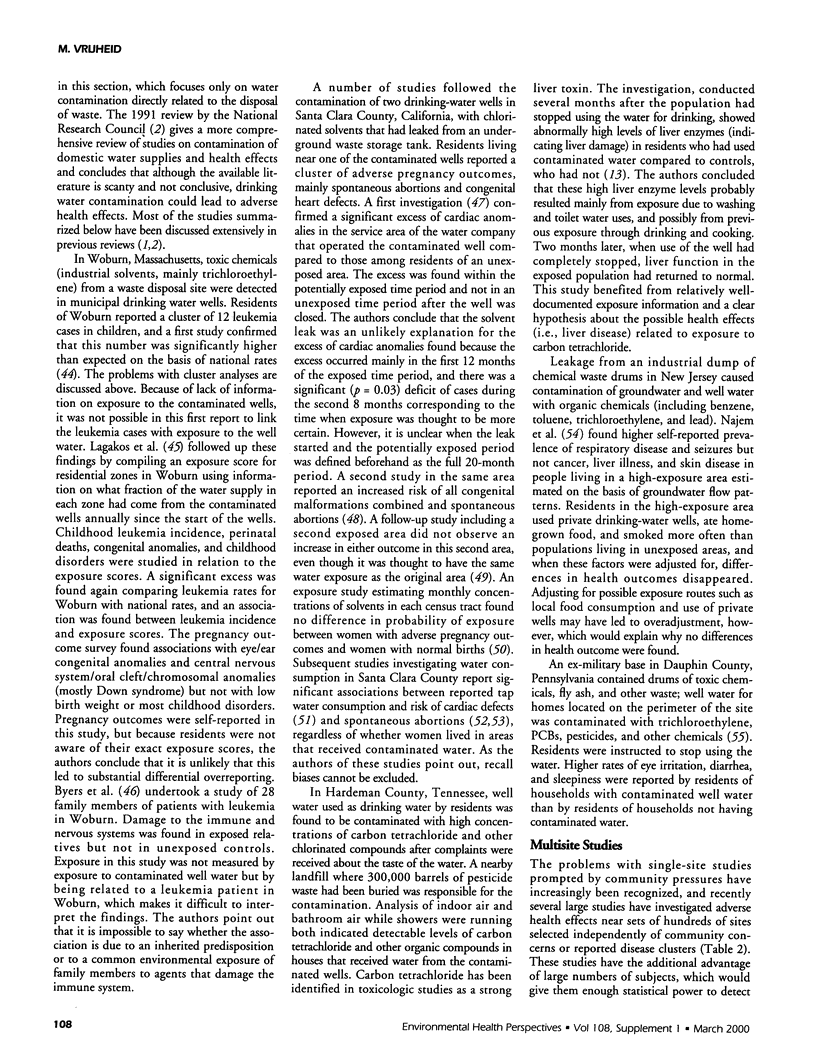
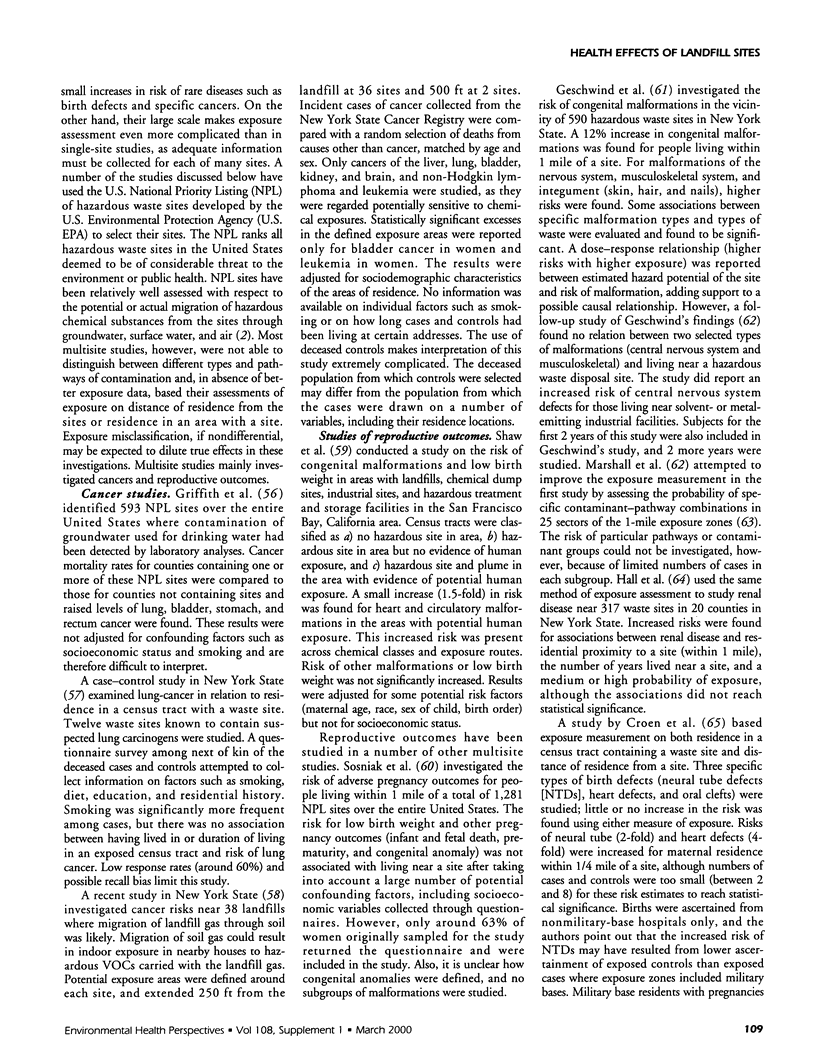
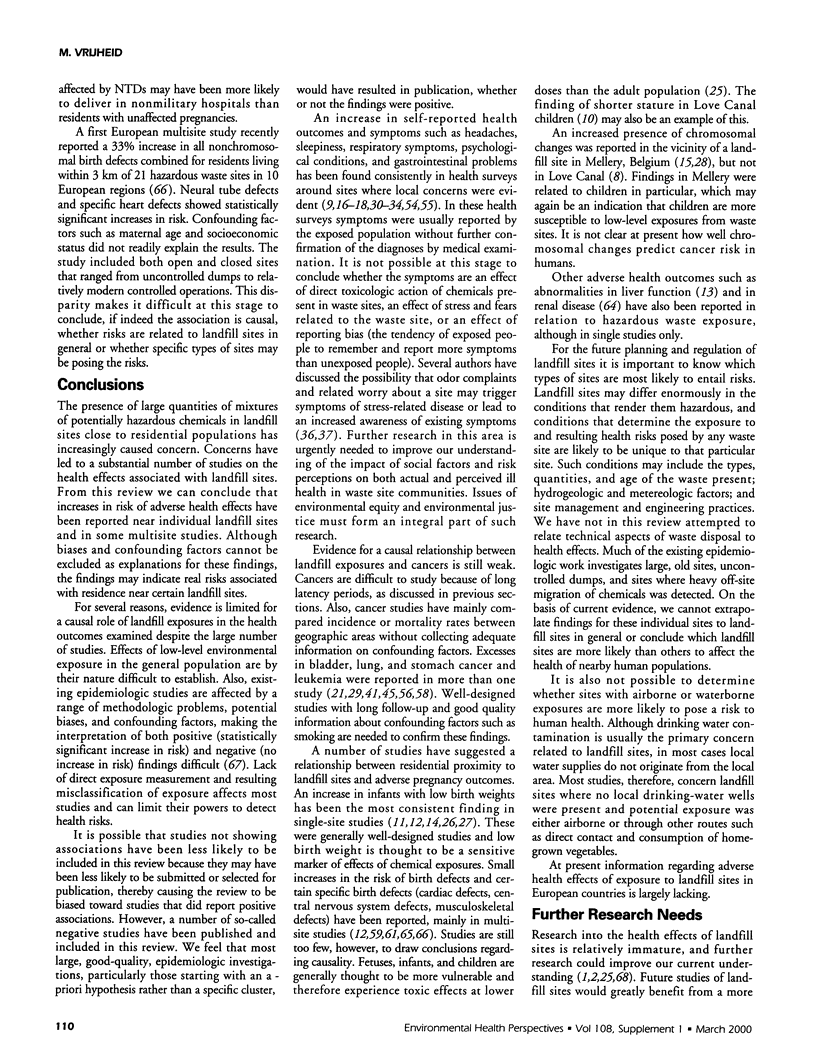
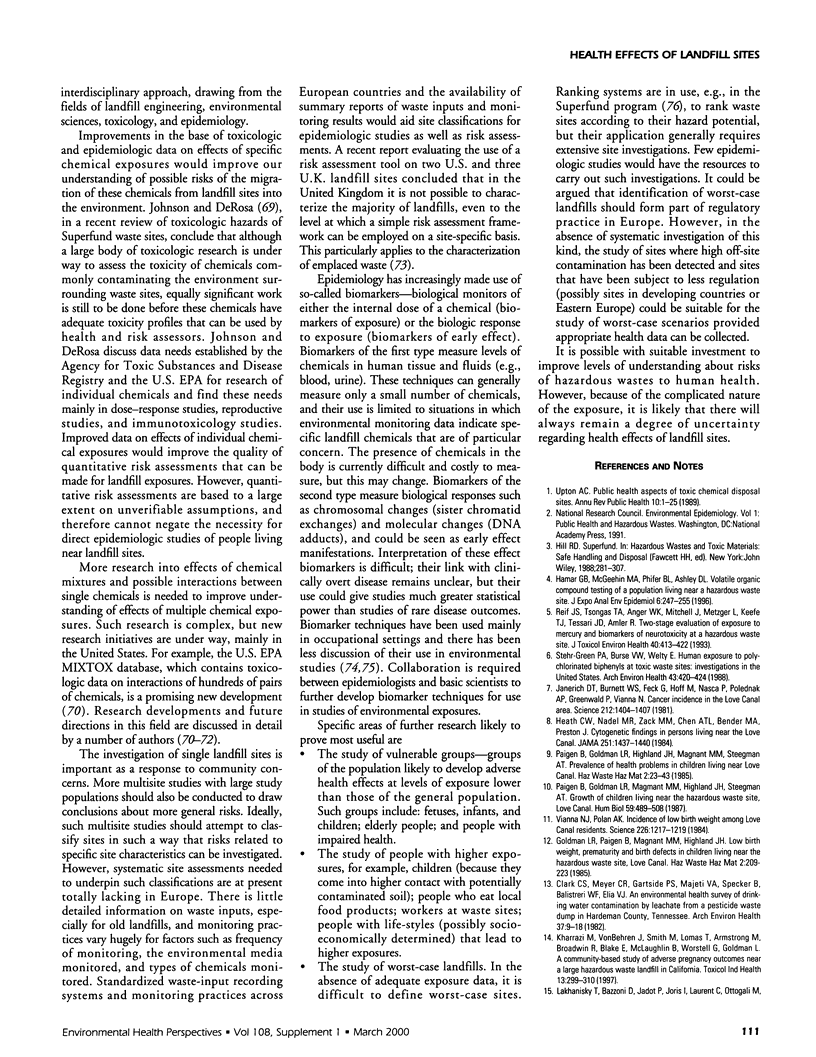
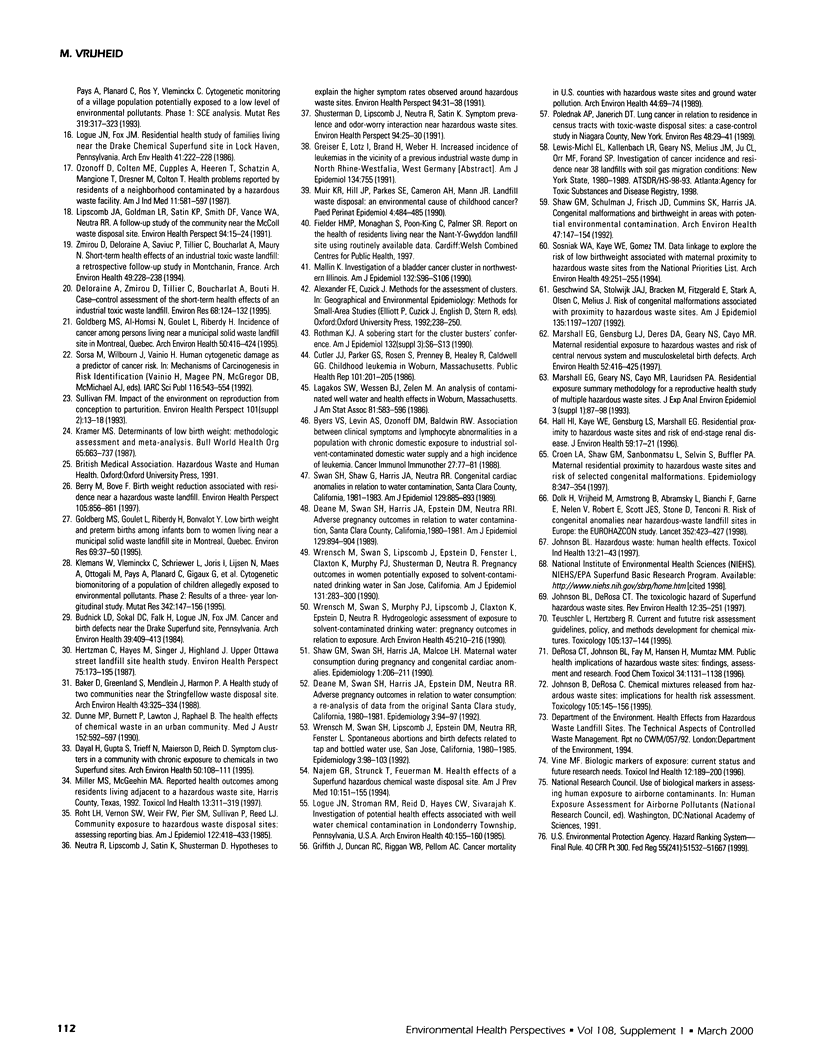
Selected References
These references are in PubMed. This may not be the complete list of references from this article.
- Baker D. B., Greenland S., Mendlein J., Harmon P. A health study of two communities near the Stringfellow Waste Disposal site. Arch Environ Health. 1988 Sep-Oct;43(5):325–334. doi: 10.1080/00039896.1988.9934943. [DOI] [PubMed] [Google Scholar]
- Berry M., Bove F. Birth weight reduction associated with residence near a hazardous waste landfill. Environ Health Perspect. 1997 Aug;105(8):856–861. doi: 10.1289/ehp.97105856. [DOI] [PMC free article] [PubMed] [Google Scholar]
- Budnick L. D., Logue J. N., Sokal D. C., Fox J. M., Falk H. Cancer and birth defects near the Drake Superfund site, Pennsylvania. Arch Environ Health. 1984 Nov-Dec;39(6):409–413. doi: 10.1080/00039896.1984.10545873. [DOI] [PubMed] [Google Scholar]
- Byers V. S., Levin A. S., Ozonoff D. M., Baldwin R. W. Association between clinical symptoms and lymphocyte abnormalities in a population with chronic domestic exposure to industrial solvent-contaminated domestic water supply and a high incidence of leukaemia. Cancer Immunol Immunother. 1988;27(1):77–81. doi: 10.1007/BF00205762. [DOI] [PMC free article] [PubMed] [Google Scholar]
- Clark C. S., Meyer C. R., Balistreri W. F., Gartside P. S., Elia V. J., Majeti V. A., Specker B. An environmental health survey of drinking water contamination by leachate from a pesticide waste dump in Hardeman County, Tennessee. Arch Environ Health. 1982 Jan-Feb;37(1):9–18. doi: 10.1080/00039896.1982.10667526. [DOI] [PubMed] [Google Scholar]
- Croen L. A., Shaw G. M., Sanbonmatsu L., Selvin S., Buffler P. A. Maternal residential proximity to hazardous waste sites and risk for selected congenital malformations. Epidemiology. 1997 Jul;8(4):347–354. doi: 10.1097/00001648-199707000-00001. [DOI] [PubMed] [Google Scholar]
- Cutler J. J., Parker G. S., Rosen S., Prenney B., Healey R., Caldwell G. G. Childhood leukemia in Woburn, Massachusetts. Public Health Rep. 1986 Mar-Apr;101(2):201–205. [PMC free article] [PubMed] [Google Scholar]
- Dayal H., Gupta S., Trieff N., Maierson D., Reich D. Symptom clusters in a community with chronic exposure to chemicals in two superfund sites. Arch Environ Health. 1995 Mar-Apr;50(2):108–111. doi: 10.1080/00039896.1995.9940887. [DOI] [PubMed] [Google Scholar]
- De Rosa C. T., Johnson B. L., Fay M., Hansen H., Mumtaz M. M. Public health implications of hazardous waste sites: findings, assessment and research. Food Chem Toxicol. 1996 Nov-Dec;34(11-12):1131–1138. doi: 10.1016/s0278-6915(97)00084-7. [DOI] [PubMed] [Google Scholar]
- Deane M., Swan S. H., Harris J. A., Epstein D. M., Neutra R. R. Adverse pregnancy outcomes in relation to water consumption: a re-analysis of data from the original Santa Clara County Study, California, 1980-1981. Epidemiology. 1992 Mar;3(2):94–97. doi: 10.1097/00001648-199203000-00005. [DOI] [PubMed] [Google Scholar]
- Deane M., Swan S. H., Harris J. A., Epstein D. M., Neutra R. R. Adverse pregnancy outcomes in relation to water contamination, Santa Clara County, California, 1980-1981. Am J Epidemiol. 1989 May;129(5):894–904. doi: 10.1093/oxfordjournals.aje.a115223. [DOI] [PubMed] [Google Scholar]
- Deloraine A., Zmirou D., Tillier C., Boucharlat A., Bouti H. Case-control assessment of the short-term health effects of an industrial toxic waste landfill. Environ Res. 1995 Feb;68(2):124–132. doi: 10.1006/enrs.1995.1016. [DOI] [PubMed] [Google Scholar]
- Dolk H., Vrijheid M., Armstrong B., Abramsky L., Bianchi F., Garne E., Nelen V., Robert E., Scott J. E., Stone D. Risk of congenital anomalies near hazardous-waste landfill sites in Europe: the EUROHAZCON study. Lancet. 1998 Aug 8;352(9126):423–427. doi: 10.1016/s0140-6736(98)01352-x. [DOI] [PubMed] [Google Scholar]
- Dunne M. P., Burnett P., Lawton J., Raphael B. The health effects of chemical waste in an urban community. Med J Aust. 1990 Jun 4;152(11):592–597. [PubMed] [Google Scholar]
- Geschwind S. A., Stolwijk J. A., Bracken M., Fitzgerald E., Stark A., Olsen C., Melius J. Risk of congenital malformations associated with proximity to hazardous waste sites. Am J Epidemiol. 1992 Jun 1;135(11):1197–1207. doi: 10.1093/oxfordjournals.aje.a116226. [DOI] [PubMed] [Google Scholar]
- Goldberg M. S., Goulet L., Riberdy H., Bonvalot Y. Low birth weight and preterm births among infants born to women living near a municipal solid waste landfill site in Montreal, Quebec. Environ Res. 1995 Apr;69(1):37–50. doi: 10.1006/enrs.1995.1023. [DOI] [PubMed] [Google Scholar]
- Goldberg M. S., al-Homsi N., Goulet L., Riberdy H. Incidence of cancer among persons living near a municipal solid waste landfill site in Montreal, Québec. Arch Environ Health. 1995 Nov-Dec;50(6):416–424. doi: 10.1080/00039896.1995.9935977. [DOI] [PubMed] [Google Scholar]
- Hamar G. B., McGeehin M. A., Phifer B. L., Ashley D. L. Volatile organic compound testing of a population living near a hazardous waste site. J Expo Anal Environ Epidemiol. 1996 Apr-Jun;6(2):247–255. [PubMed] [Google Scholar]
- Heath C. W., Jr, Nadel M. R., Zack M. M., Jr, Chen A. T., Bender M. A., Preston R. J. Cytogenetic findings in persons living near the Love Canal. JAMA. 1984 Mar 16;251(11):1437–1440. [PubMed] [Google Scholar]
- Hertzman C., Hayes M., Singer J., Highland J. Upper Ottawa street landfill site health study. Environ Health Perspect. 1987 Nov;75:173–195. doi: 10.1289/ehp.8775173. [DOI] [PMC free article] [PubMed] [Google Scholar]
- Janerich D. T., Burnett W. S., Feck G., Hoff M., Nasca P., Polednak A. P., Greenwald P., Vianna N. Cancer incidence in the Love Canal area. Science. 1981 Jun 19;212(4501):1404–1407. doi: 10.1126/science.7233229. [DOI] [PubMed] [Google Scholar]
- Johnson B. L., DeRosa C. T. Chemical mixtures released from hazardous waste sites: implications for health risk assessment. Toxicology. 1995 Dec 28;105(2-3):145–156. doi: 10.1016/0300-483x(95)03208-w. [DOI] [PubMed] [Google Scholar]
- Johnson B. L., DeRosa C. The toxicologic hazard of superfund hazardous-waste sites. Rev Environ Health. 1997 Oct-Dec;12(4):235–251. doi: 10.1515/reveh.1997.12.4.235. [DOI] [PubMed] [Google Scholar]
- Kharrazi M., Von Behren J., Smith M., Lomas T., Armstrong M., Broadwin R., Blake E., McLaughlin B., Worstell G., Goldman L. A community-based study of adverse pregnancy outcomes near a large hazardous waste landfill in California. Toxicol Ind Health. 1997 Mar-Jun;13(2-3):299–310. doi: 10.1177/074823379701300215. [DOI] [PubMed] [Google Scholar]
- Klemans W., Vleminckx C., Schriewer L., Joris I., Lijsen N., Maes A., Ottogali M., Pays A., Planard C., Rigaux G. Cytogenetic biomonitoring of a population of children allegedly exposed to environmental pollutants. Phase 2: Results of a three-year longitudinal study. Mutat Res. 1995 Apr;342(3-4):147–156. doi: 10.1016/0165-1218(95)90024-1. [DOI] [PubMed] [Google Scholar]
- Kramer M. S. Determinants of low birth weight: methodological assessment and meta-analysis. Bull World Health Organ. 1987;65(5):663–737. [PMC free article] [PubMed] [Google Scholar]
- Lakhanisky T., Bazzoni D., Jadot P., Joris I., Laurent C., Ottogali M., Pays A., Planard C., Ros Y., Vleminckx C. Cytogenetic monitoring of a village population potentially exposed to a low level of environmental pollutants. Phase 1:SCE analysis. Mutat Res. 1993 Dec;319(4):317–323. doi: 10.1016/0165-1218(93)90021-5. [DOI] [PubMed] [Google Scholar]
- Lipscomb J. A., Goldman L. R., Satin K. P., Smith D. F., Vance W. A., Neutra R. R. A follow-up study of the community near the McColl waste disposal site. Environ Health Perspect. 1991 Aug;94:15–24. doi: 10.1289/ehp.94-1567957. [DOI] [PMC free article] [PubMed] [Google Scholar]
- Logue J. N., Fox J. M. Residential health study of families living near the Drake Chemical Superfund site in Lock Haven, Pennsylvania. Arch Environ Health. 1986 Jul-Aug;41(4):222–228. doi: 10.1080/00039896.1986.9938337. [DOI] [PubMed] [Google Scholar]
- Logue J. N., Stroman R. M., Reid D., Hayes C. W., Sivarajah K. Investigation of potential health effects associated with well water chemical contamination in Londonderry Township, Pennsylvania, U.S.A. Arch Environ Health. 1985 May-Jun;40(3):155–160. doi: 10.1080/00039896.1985.10545909. [DOI] [PubMed] [Google Scholar]
- Mallin K. Investigation of a bladder cancer cluster in northwestern Illinois. Am J Epidemiol. 1990 Jul;132(1 Suppl):S96–106. doi: 10.1093/oxfordjournals.aje.a115795. [DOI] [PubMed] [Google Scholar]
- Marshall E. G., Geary N. S., Cayo M. R., Lauridsen P. A. Residential exposure summary methodology for a reproductive health study of multiple hazardous waste sites. J Expo Anal Environ Epidemiol. 1993;3 (Suppl 1):87–98. [PubMed] [Google Scholar]
- Marshall E. G., Gensburg L. J., Deres D. A., Geary N. S., Cayo M. R. Maternal residential exposure to hazardous wastes and risk of central nervous system and musculoskeletal birth defects. Arch Environ Health. 1997 Nov-Dec;52(6):416–425. doi: 10.1080/00039899709602220. [DOI] [PubMed] [Google Scholar]
- Miller M. S., McGeehin M. A. Reported health outcomes among residents living adjacent to a hazardous waste site, Harris County, Texas, 1992. Toxicol Ind Health. 1997 Mar-Jun;13(2-3):311–319. doi: 10.1177/074823379701300216. [DOI] [PubMed] [Google Scholar]
- Muir K. R., Hill J. P., Parkes S. E., Cameron A. H., Mann J. R. Landfill waste disposal: an environmental cause of childhood cancer? Paediatr Perinat Epidemiol. 1990 Oct;4(4):484–485. doi: 10.1111/j.1365-3016.1990.tb00676.x. [DOI] [PubMed] [Google Scholar]
- Najem G. R., Strunck T., Feuerman M. Health effects of a Superfund hazardous chemical waste disposal site. Am J Prev Med. 1994 May-Jun;10(3):151–155. [PubMed] [Google Scholar]
- Neutra R., Lipscomb J., Satin K., Shusterman D. Hypotheses to explain the higher symptom rates observed around hazardous waste sites. Environ Health Perspect. 1991 Aug;94:31–38. doi: 10.1289/ehp.94-1567952. [DOI] [PMC free article] [PubMed] [Google Scholar]
- Ozonoff D., Colten M. E., Cupples A., Heeren T., Schatzkin A., Mangione T., Dresner M., Colton T. Health problems reported by residents of a neighborhood contaminated by a hazardous waste facility. Am J Ind Med. 1987;11(5):581–597. doi: 10.1002/ajim.4700110510. [DOI] [PubMed] [Google Scholar]
- Paigen B., Goldman L. R., Magnant M. M., Highland J. H., Steegmann A. T., Jr Growth of children living near the hazardous waste site, Love Canal. Hum Biol. 1987 Jun;59(3):489–508. [PubMed] [Google Scholar]
- Polednak A. P., Janerich D. T. Lung cancer in relation to residence in census tracts with toxic-waste disposal sites: a case-control study in Niagara County, New York. Environ Res. 1989 Feb;48(1):29–41. doi: 10.1016/s0013-9351(89)80082-9. [DOI] [PubMed] [Google Scholar]
- Reif J. S., Tsongas T. A., Anger W. K., Mitchell J., Metzger L., Keefe T. J., Tessari J. D., Amler R. Two-stage evaluation of exposure to mercury and biomarkers of neurotoxicity at a hazardous waste site. J Toxicol Environ Health. 1993 Oct-Nov;40(2-3):413–422. doi: 10.1080/15287399309531808. [DOI] [PubMed] [Google Scholar]
- Roht L. H., Vernon S. W., Weir F. W., Pier S. M., Sullivan P., Reed L. J. Community exposure to hazardous waste disposal sites: assessing reporting bias. Am J Epidemiol. 1985 Sep;122(3):418–433. doi: 10.1093/oxfordjournals.aje.a114123. [DOI] [PubMed] [Google Scholar]
- Rothman K. J. A sobering start for the cluster busters' conference. Am J Epidemiol. 1990 Jul;132(1 Suppl):S6–13. doi: 10.1093/oxfordjournals.aje.a115790. [DOI] [PubMed] [Google Scholar]
- Shaw G. M., Schulman J., Frisch J. D., Cummins S. K., Harris J. A. Congenital malformations and birthweight in areas with potential environmental contamination. Arch Environ Health. 1992 Mar-Apr;47(2):147–154. doi: 10.1080/00039896.1992.10118769. [DOI] [PubMed] [Google Scholar]
- Shaw G. M., Swan S. H., Harris J. A., Malcoe L. H. Maternal water consumption during pregnancy and congenital cardiac anomalies. Epidemiology. 1990 May;1(3):206–211. doi: 10.1097/00001648-199005000-00005. [DOI] [PubMed] [Google Scholar]
- Shusterman D., Lipscomb J., Neutra R., Satin K. Symptom prevalence and odor-worry interaction near hazardous waste sites. Environ Health Perspect. 1991 Aug;94:25–30. doi: 10.1289/ehp.94-1567940. [DOI] [PMC free article] [PubMed] [Google Scholar]
- Sorsa M., Wilbourn J., Vainio H. Human cytogenetic damage as a predictor of cancer risk. IARC Sci Publ. 1992;(116):543–554. [PubMed] [Google Scholar]
- Sosniak W. A., Kaye W. E., Gomez T. M. Data linkage to explore the risk of low birthweight associated with maternal proximity to hazardous waste sites from the National Priorities List. Arch Environ Health. 1994 Jul-Aug;49(4):251–255. doi: 10.1080/00039896.1994.9937475. [DOI] [PubMed] [Google Scholar]
- Stehr-Green P. A., Welty E., Burse V. W. Human exposure to polychlorinated biphenyls at toxic waste sites: investigations in the United States. Arch Environ Health. 1988 Nov-Dec;43(6):420–424. doi: 10.1080/00039896.1988.9935861. [DOI] [PubMed] [Google Scholar]
- Sullivan F. M. Impact of the environment on reproduction from conception to parturition. Environ Health Perspect. 1993 Jul;101 (Suppl 2):13–18. doi: 10.1289/ehp.93101s213. [DOI] [PMC free article] [PubMed] [Google Scholar]
- Swan S. H., Shaw G., Harris J. A., Neutra R. R. Congenital cardiac anomalies in relation to water contamination, Santa Clara County, California, 1981-1983. Am J Epidemiol. 1989 May;129(5):885–893. doi: 10.1093/oxfordjournals.aje.a115222. [DOI] [PubMed] [Google Scholar]
- Teuschler L. K., Hertzberg R. C. Current and future risk assessment guidelines, policy, and methods development for chemical mixtures. Toxicology. 1995 Dec 28;105(2-3):137–144. doi: 10.1016/0300-483x(95)03207-v. [DOI] [PubMed] [Google Scholar]
- Upton A. C., Kneip T., Toniolo P. Public health aspects of toxic chemical disposal sites. Annu Rev Public Health. 1989;10:1–25. doi: 10.1146/annurev.pu.10.050189.000245. [DOI] [PubMed] [Google Scholar]
- Vianna N. J., Polan A. K. Incidence of low birth weight among Love Canal residents. Science. 1984 Dec 7;226(4679):1217–1219. doi: 10.1126/science.6505690. [DOI] [PubMed] [Google Scholar]
- Vine M. F. Biologic markers of exposure: current status and future research needs. Toxicol Ind Health. 1996 Mar-Apr;12(2):189–200. [PubMed] [Google Scholar]
- Wrensch M., Swan S. H., Lipscomb J., Epstein D. M., Neutra R. R., Fenster L. Spontaneous abortions and birth defects related to tap and bottled water use, San Jose, California, 1980-1985. Epidemiology. 1992 Mar;3(2):98–103. doi: 10.1097/00001648-199203000-00006. [DOI] [PubMed] [Google Scholar]
- Wrensch M., Swan S., Lipscomb J., Epstein D., Fenster L., Claxton K., Murphy P. J., Shusterman D., Neutra R. Pregnancy outcomes in women potentially exposed to solvent-contaminated drinking water in San Jose, California. Am J Epidemiol. 1990 Feb;131(2):283–300. doi: 10.1093/oxfordjournals.aje.a115498. [DOI] [PubMed] [Google Scholar]
- Wrensch M., Swan S., Murphy P. J., Lipscomb J., Claxton K., Epstein D., Neutra R. Hydrogeologic assessment of exposure to solvent-contaminated drinking water: pregnancy outcomes in relation to exposure. Arch Environ Health. 1990 Jul-Aug;45(4):210–216. doi: 10.1080/00039896.1990.9940804. [DOI] [PubMed] [Google Scholar]
- Zmirou D., Deloraine A., Saviuc P., Tillier C., Boucharlat A., Maury N. Short-term health effects of an industrial toxic waste landfill: a retrospective follow-up study in Montchanin, France. Arch Environ Health. 1994 Jul-Aug;49(4):228–238. doi: 10.1080/00039896.1994.9937472. [DOI] [PubMed] [Google Scholar]


